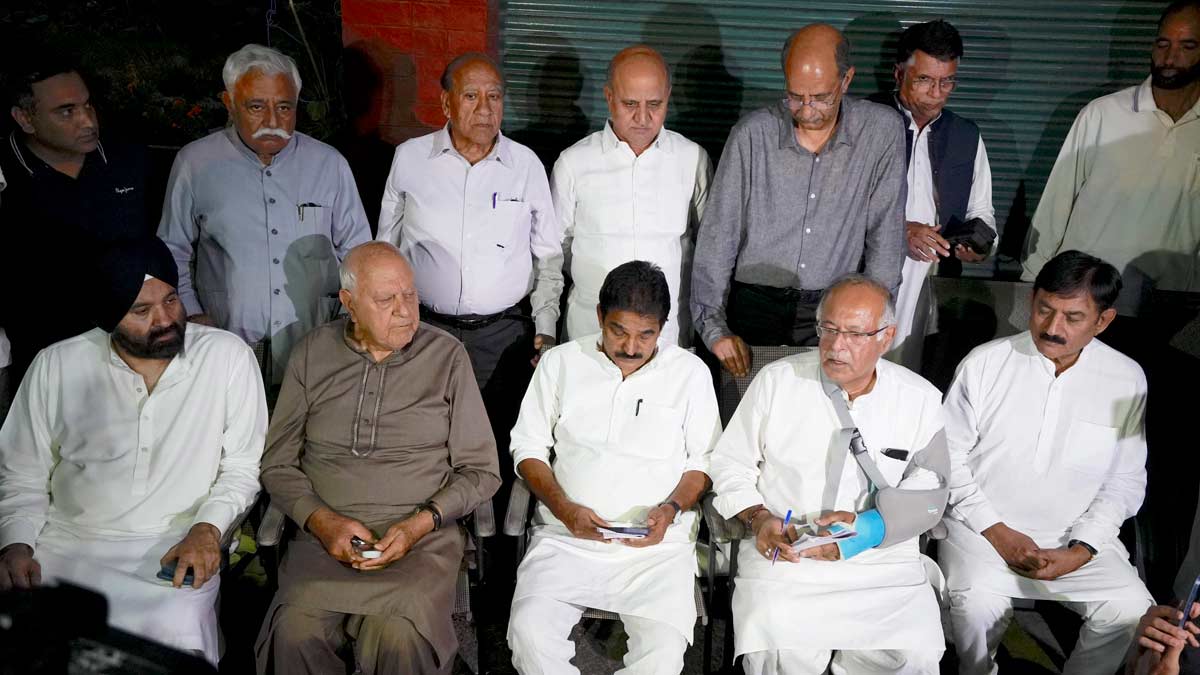Eight Months Into Power, NC-Congress Alliance in Jammu & Kashmir Yet to Finalize Common Minimum Programme
By: Javid Amin | 29 July 2025
Political Alliance Without Policy Blueprint
Eight months after forming a post-poll alliance, the National Conference (NC) and Congress—governing Jammu & Kashmir—still have no Common Minimum Programme (CMP). This absence is triggering growing concern from within and outside the alliance, as citizens demand clarity on governance goals and administrative direction.
Congress leader Tariq Hameed Karra has publicly questioned the delay, warning that the lack of a policy roadmap may erode public faith and hinder decision-making at a critical juncture for the Union Territory.
“The alliance was stitched post-election for numbers. But without a joint vision document, there’s no clarity on how we govern,” Karra said.
The Nature of the Alliance: Numbers Without Unity?
The NC and Congress collectively command a majority in the 90-member Assembly, but their political understanding appears to be limited to seat-sharing rather than comprehensive governance coordination.
Congress’ Position:
-
Support from outside: Congress has refused to take ministerial berths, citing its demand for full statehood restoration.
-
Internal Divisions: Senior leaders within the Congress, including Karra and others, have reportedly clashed on how engaged the party should be with the NC-led administration.
-
Confused Messaging: Congress cadres are unsure whether to take credit for government initiatives or distance themselves from perceived misgovernance.
NC’s Position:
-
De Facto Leadership: NC holds key administrative positions and leads the coalition front.
-
Calls for Patience: Omar Abdullah and senior NC leaders maintain that the alliance is functional, but acknowledge “communication gaps” with their Congress allies.
-
Reluctance to Commit to CMP: Sources suggest the NC is cautious about ceding policy flexibility, especially on sensitive issues like Article 370, autonomy, and Centre-state relations.
Why a CMP Matters
A Common Minimum Programme (CMP) is typically issued by coalition governments to:
-
Establish shared priorities
-
Clarify governance frameworks
-
Reassure the public and investors of stability
-
Prevent policy conflicts between partners
Without it, J&K’s administration operates in ambiguity, especially at a time when the region is under:
-
Partial statehood
-
Dual administrative control (with both an elected government and a Lieutenant Governor answering directly to the Centre)
-
Mounting socio-political challenges
“The absence of a CMP is more than a technical lapse—it’s a failure to present a coherent governance model to the people of Jammu and Kashmir,” a senior political analyst noted.
Critical Issues Lacking Unified Direction
The political vacuum left by the absence of a CMP has left several core issues unresolved:
01. Restoration of Statehood
-
Congress has made it a red line for any deeper engagement.
-
NC leaders offer verbal support but lack consensus on how or when to push the Centre.
02. Development & Infrastructure
-
Funding delays and bureaucratic confusion over who approves major projects—the government or LG—are stalling progress.
03. Business Rules & Decision-making Authority
-
With no joint mechanism in place, routine decisions are mired in delays, often subject to central review.
04. Security & Autonomy
-
Congress treads carefully on issues like AFSPA and police reform.
-
NC seeks more autonomy and decentralization, but without a CMP, these goals remain aspirational rather than actionable.
Coalition Friction or Growing Pains?
Observers say the lack of a CMP is a symptom of deeper discomfort between the two parties. While both campaigned on a platform of resisting BJP’s influence in J&K, their post-election conduct suggests more tactical alignment than ideological agreement.
Internal Rifts Exposed:
-
Karra’s criticism is not just directed at the NC, but also at his own party’s indecisiveness.
-
Congress insiders suggest that infighting has prevented meaningful dialogue with NC on formalizing a joint agenda.
“You can’t run a government on press conferences and informal chats. You need structure. The public expects performance, not just posturing,” Karra added.
Public Patience Running Thin
With public expectations high, especially after elections raised hopes for political normalization, many Kashmiris are growing restless. The delay in restoring statehood, lack of clear governance directives, and continued presence of central override through the LG are fuelling skepticism.
For the average citizen, the absence of a CMP translates into:
-
No clarity on job creation or economic recovery
-
Ambiguity over legal and administrative procedures
-
Continued uncertainty about their political future
What Next for the Alliance?
Unless a Common Minimum Programme is urgently adopted, the NC-Congress alliance risks:
-
Losing public trust
-
Fueling regional instability
-
Providing political ammunition to the BJP, which remains a vocal critic of the alliance’s “directionless governance”
Senior Congress figures are reportedly pushing for a joint policy retreat, possibly in Srinagar, to iron out differences. NC, while open to discussions, is said to be wary of “overcommitting” on contentious issues.
Final Takeaway: Can Governance Thrive Without Alignment?
The NC-Congress coalition was hailed as a symbol of democratic revival after years of central rule. But without a shared vision, it risks becoming a case study in fractured governance.
The question remains:
Can two parties run a state with no agreed agenda, and still promise a better future for its people?




